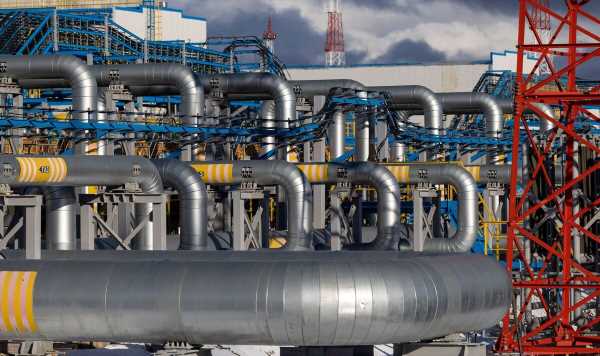Ukraine: Russian sanctions ‘only just started working’ says Rudik
We use your sign-up to provide content in ways you’ve consented to and to improve our understanding of you. This may include adverts from us and 3rd parties based on our understanding. You can unsubscribe at any time. More info
Britain’s sanctions targeting Russia’s economy are hitting home thanks to the ‘decisive’ approach adopted by London since the start of the war, a Kyiv-based economist has said. But Vladyslsav Vlasiuk nevertheless urged the West – especially the EU – to turn the screw, not least by targeting wealthy Russian “cultural figures, artists and academics” who remain free to “go on lavish vacations and ink mega-business deals”.
Mr Vlasiuk was speaking as the first anniversary of Putin’s invasion on February 24, 2022, approaches – and he acknowledged Britain has led the way with the strength of its response ever since.
He told Express.co.uk: “Britain has been very decisive in its foreign policy and is among the leading jurisdictions when it comes to imposing sanctions against Russia.
“Over the past year, Britain has introduced a wide rang of bans and exemptions that are crippling Russia’s economy, including the ban on Russian oil and gas imports, and gold from Russia.
“Additionally, the UK government has frozen assets of major Russian oligarchs, like Abramovich’s Evraz. “
After President Volodymyr Zelensky’s visit to the UK earlier this month, the British government announced new sanctions against the Russian military complex and more Kremlin elites, Mr Vlasiuk pointed out.
He continued: ‘These new sanctions will help accelerate the economic pressures on Putin and undermine his war machine in Ukraine.”
Nevertheless, more remained to be done, Mr Vlasiuk said.
He explained: “We would like to see the UK government extend its current sanctions regime to include Russian propagandists and spreaders of fake information, sanctions against banks involved in servicing the military-industrial complex, sanctions against Rosatom, toughening visa restrictions for supporters of the Kremlin, and further prohibition of professional services to Russians, including IT and legal.”


Speaking more generally he warned: “Sanction policies must be complied with immediately to cause a bigger effect. There are also several third-party countries and companies that are allowing for sanctions circumvention.
“Individuals and entities within the Russian regime are bypassing sanctioned processes by outsourcing to ‘high risk’ countries or offshore companies.
“Again, the West must coordinate to ensure these loopholes are closed and punishable by law.”
Referring to Russia’s state-owned energy company, and echoing remarks by Ukrainian MP Inna Sovsun, Mr Vlasiuk said: “We must extend the current sanctions packages to include more companies that benefit the Kremlin directly – like Rosatom – as well as individuals that are supporting Russian propaganda and false narratives against Ukraine’s integrity and territory, these are Russian propagandists (cultural figures, artists, academics, etc).
“Last but not least, strengthening sanctions on more sectors, including professional services (IT and legal) and diamonds and metallurgy industry are crucial to weaken Russia’s economy and war machine.”
Up to now, the sectors of Russia’s economy worst-hit by sanctions related to technology and energy, Mr Vlasiuk pointed out, with the numerous restrictions imposed on exports to Russia focusing on high-technology goods, ultimately weakening Russia’s production capacity for its military complex.
JUST IN: West urged to cripple Putin’s ‘trojan horse’ company


He added: “Public data also shows that some car production and aviation sectors are being hit hard.
“Russian fiscal revenues have not significantly suffered from sanctions, yet. However, this picture of economic stability is coming to an end soon, given the extent of sanctions.”
The exit of Western firms and corporations, gradual energy decoupling by the EU, and Russia’s inability to find equal alternatives would damage the Russian economy “severely”, he predicted.
Still greater sanctions coordination across the globe was nevertheless needed to isolate the Russian economy, limit the flow of income into Russian entities, and help stop the war, he argued.
In a direct message to Brussels, Mr Vlasiuk said: “We need the EU to strengthen sanctions against Russian propagandists, adding more names of cultural figures, artists, and academics who criticise the Western ‘way of life’, then go on lavish vacations and ink mega-business deals with companies from the Western world.”
Such people also promoted Putin’s “false narratives” about Ukraine’s sovereignty and “spread lies and misinformation” about Ukrainian nationality and integrity, Mr Vlasiuk said.

Additionally, he pushed for stronger financial sanctions, in particular the disconnection of Russian banks, including Alfa Bank, Tinkof Bank, Rosbank, Bank Sankt-
Peterburg, Bank Zenit and Gazprombank, from SWIFT.
Over time a coordinated approach would ultimately bring an end to Russian aggression, Mr Vlasiuk stressed.
He said: “Lost investment, export controls, and constraints on Russia’s real economy is bound to affect Russia’s ability to wage its war efforts in Ukraine.
“We already saw how these sanctions have affected Russia’s access to key technologies and industrial inputs which compromised its military capability.
“Sanctions will increase the cost on Russia for its illegal aggression in Ukraine, and ultimately cripple the Federation’s war machine, bringing the war to an end.”
Source: Read Full Article
